The Inflation Reduction Act and Contractors
By My Service Depot on Thursday, January 12, 2023What You Need to Know to Take Advantage of Energy Upgrades
High inflation has many Americans worried. Thankfully, the Inflation Reduction Act was passed in 2022, bringing relief to many American families and businesses. The Inflation Reduction Act, or IRA, is meant to help curb inflation rates by reducing the deficit, lowering costs for drugs and healthcare, assisting homeowners by extending certain tax credits, and by investing in American energy.
What does all of this mean for homeowners, contractors, and small businesses? In the following guide, we’ll cover what the Inflation Reduction Act is, what is included in it, and what effects it will have on homeowners, building contractors, and small business owners. Read on to learn more about the IRA.
What is the Inflation Reduction Act?
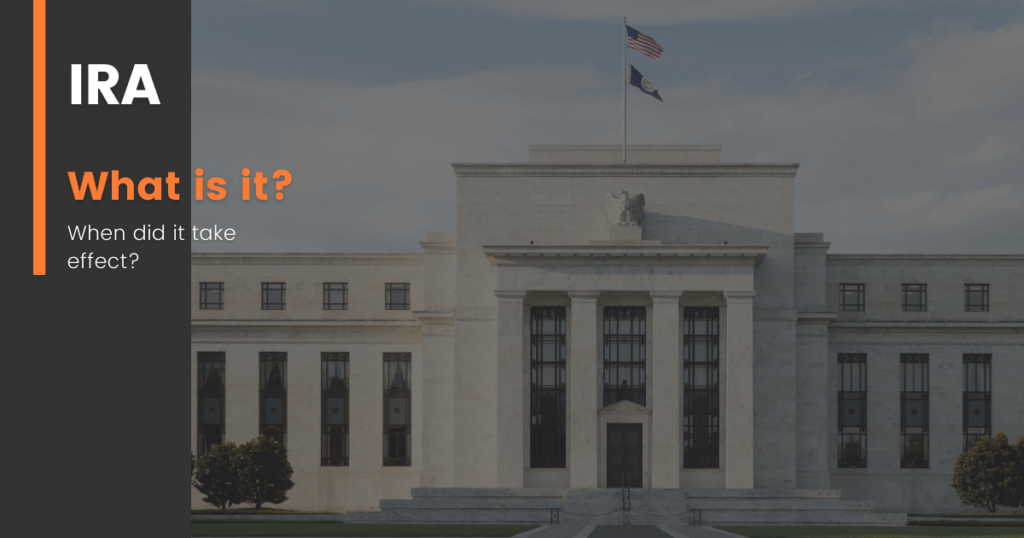
The Inflation Reduction Act, also known as the IRA, is a landmark federal law that passed in 2022. It took many months of negotiation before it finally passed the House and the Senate. The IRA is widely considered groundbreaking legislation, the first law to invest so much into many environmental efforts, invest in American manufacturing and production, and help cut costs for American families. It is billed as the single largest investment in the fight against climate change in American history, according to the Department of Energy.
This new federal law helps with deficit reduction measures, domestic energy production, and domestic manufacturing and aims to reduce carbon emissions by 40% by the year 2030. This law will also include provisions for saving individuals and small businesses on healthcare and drug costs.
What’s in the Inflation Reduction Act?
The Inflation Reduction Act includes significant investments in making healthcare and drugs more affordable, aiding in the fight against climate change, and giving benefits to homeowners and small businesses in the form of tax credits for switching to greener appliances and technology.
The IRA addresses many things Americans are concerned about. This bill encourages businesses and contractors to invent clean energy technologies, such as solar power, wind, and geothermal. It offers support for rural small businesses and energy producers. This law also reforms the tax code, allowing more companies to qualify for tax credits. There are many benefits in the IRA for homeowners, small businesses, and contractors to take advantage of.
When was the Inflation Reduction Act Passed?
The Inflation Reduction Act, or IRA, was voted on and passed by the United States congress on August 12, 2022. It took many months of negotiation to get the bill passed in both the House and the Senate. Finally, President Biden passed the Inflation Reduction Act into law on August 16, 2022. This landmark legislation takes effect on January 1, 2023.
What are the Benefits of the Inflation Reduction Act?
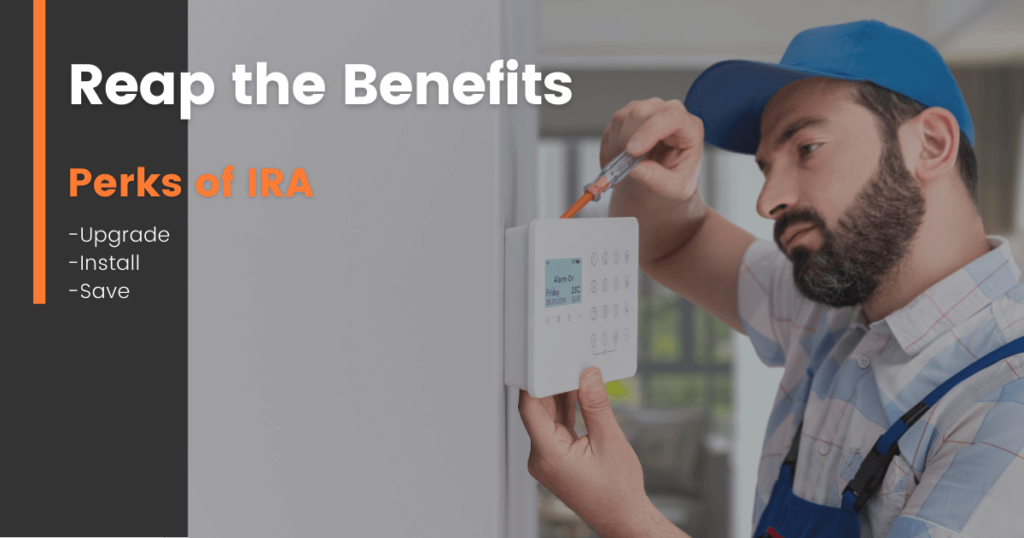
The Inflation Reduction Act has many benefits in several areas for homeowners, small businesses, and contractors alike. Many of these benefits come in the form of tax credits or rebates for taking environmentally friendly measures. There are a few wide-ranging tax incentives in the IRA. Tax credits included are for installing things like energy-efficient appliances and solar panels or purchasing clean vehicles.
Individuals and companies can take advantage of these tax credits to save money and save on energy costs as well. These tax benefits can greatly improve energy levels and save money for Americans, too.
How Does the Inflation Reduction Act Help Homeowners?
Many Americans are interested in helping fight climate change but are unsure how to do so. With the Inflation Reduction Act, homeowners can now take action when it comes to aiding the environment all while saving some money on energy costs. The IRA offers benefits to homeowners in a few ways.
The IRA gives up to $14000 for homeowners to upgrade their homes, encouraging everyone to lower their carbon footprint. The main way this is achieved is by tax credits and tax rebates for installing energy-saving appliances in the home. There are two main rebates available for homeowners.
The HOMES rebate program provides over 4 billion to states to help residents switch to more energy-efficient solutions. Homeowners that make green switches can get up to $8000 back in tax rebates.
The High-Efficiency Electric Home Rebate Act, or HEEHRA, helps low and middle-income families to switch to electricity by installing a heat pump, instead of a furnace, for example. These incentives are capped at $14000 per household, and homeowners cannot receive more than one tax rebate for the same upgrade. With these tax benefits provided by IRA, American families can lower their energy costs while also reducing their carbon footprint.
Receive a tax Credit for Installing Solar Panels
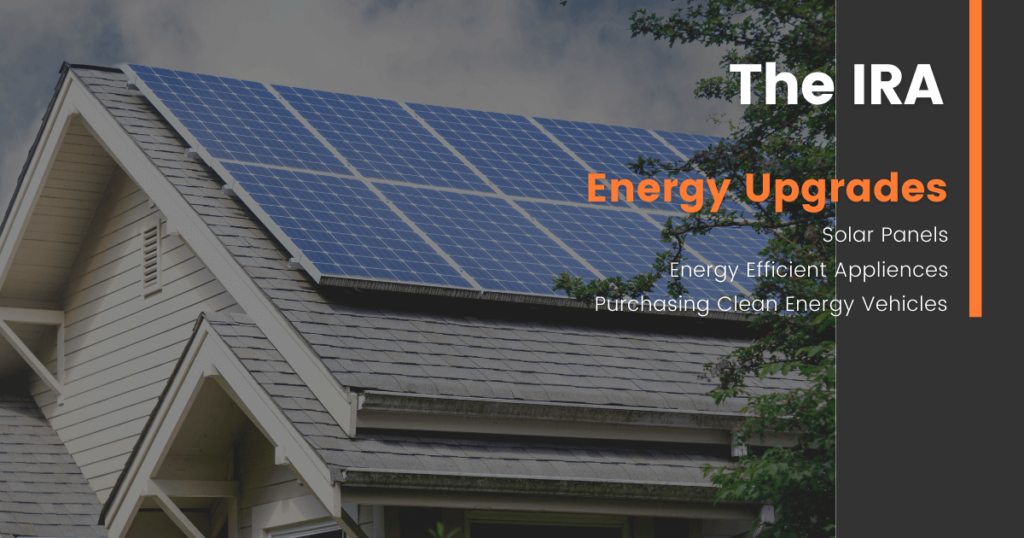
One big way the Inflation Reduction Act benefits homeowners is through tax credits. Homeowners can get tax credits by installing solar panels and other energy-efficient appliances. Rising energy and electricity costs around the country have been hurting families, but now homeowners can lower their costs and be reimbursed when they install solar panels.
Solar panels are beneficial because they offset energy costs, saving families money, and they also reduce the environmental impact of the home. The IRA Residential Solar Tax Credit raised this tax benefit from 26% of the cost of installation to 30%, giving homeowners more of their investment back. This tax credit will be available for over a decade, so there is plenty of time to take advantage of these savings.
Energy Efficient Appliances get you a Rebate
A large benefit of the IRA for homeowners is getting a tax rebate on new appliances. When they install new energy-efficient appliances, homeowners can lower their energy costs and help the environment, all while getting a rebate for some of the cost.
Each household can get a maximum rebate of $14000 by switching to greener appliances. This is a wonderful incentive for families to go green, all while lowering their utility bills. What kind of appliances does this rebate apply to?
This tax credit applies to appliances like:
- heat pump water heaters
- Electric stoves
- Electric ovens
- Electric heaters
- Electric boilers
- New energy-efficient AC units
How can Homeowners Take Advantage of the IRA?
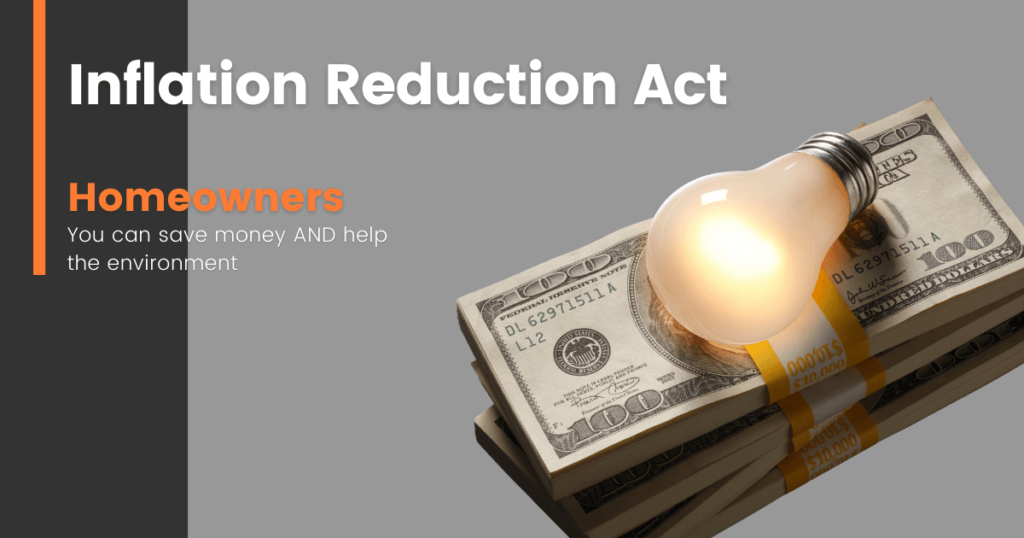
There are many benefits for homeowners to take advantage of in the IRA. Homeowners can receive benefits by making upgrades to their homes, installing clean energy appliances, and installing solar panels. Homeowners also get the added benefits of lower energy costs after making these installations. You should speak to your tax preparer to learn more about the credits and rebates you can qualify for.
You do not have to wait to take advantage of the tax credits found in the IRA. Once tax season comes around in April of 2023, you can use the credits and rebates found in this law to get credit for any applicable projects throughout the year of 2022.
How Does the Inflation Reduction Act Help Contractors?

The Inflation Reduction Act is meant to help curb greenhouse gas emissions and cut energy costs. What does this mean for building contractors? There are many provisions in the IRA aimed at helping contractors. This comes in the form of tax credits; there are several energy efficiency benefits that contractors can benefit from, including changes to the 45L Tax Credit for energy-efficient homes.
How the Inflation Reduction Act Benefits New Home Construction
The IRA includes several benefits for new construction. Contractors are incentivized to build a greener, more energy-efficient homes. There are incentives for solar, wind, and other green technologies. As contractors build these homes with energy-efficient technologies, they can be the recipients of home credits.
The home credits are as high as $5000 per home built, depending on the energy efficiency of each. There are several changes to the 179D section of the IRS tax code. This allows businesses to write off the full purchase costs of software or equipment and even vehicles if done so to improve energy efficiency.
Starting January 1, 2023, deductions for energy-efficient commercial buildings. These deductions are increasing from $1.88 per square foot to $5 per square foot. This benefit will be available through 2032.
The 45L Residential Credit, which is an energy-efficient home credit, will be extended with its current rate of $2000 per unit until the end of 2022. Starting in 2023, this will increase to up to $5000 per unit. The 45L Residential Credit and the 179D Energy Deduction will extend through the year 2032.
Energy Efficiency Tax Credits
Another benefit builders can get are energy efficiency tax credits. These tax credits have been extended through 2032. When contractors build energy-efficient single-family homes and multi-family apartment buildings, they can get the following tax incentives:
- $2500 per energy-efficient single home
- $2500 for energy-efficient manufactured homes
- $500 for every energy-efficient multifamily unit
- Contractors can also get tax credits for new energy-efficient equipment purchased
There are several great tax benefits for building contractors to take advantage of in the Inflation Reduction Act.
Investment Tax Credit
The IRA has made changes to the Investment Tax Credit, or IRC. The IRC is a tax credit meant for certain types of energy-efficient projects, such as geothermal energy, fuel cell energy, and solar energy. The IRC benefits both residential and commercial systems.
How Can Contractors Take advantage of the IRA?
There are a few different ways Contractors can take advantage of the benefits made available in the IRA. They can receive these benefits by building energy-efficient homes and buildings and getting tax incentives for each unit. They can invest in clean energy, like geothermal and solar. Also, they can purchase new energy-efficient equipment and receive a rebate. Contractors should ask their tax preparer for more information on these tax incentives.
How Does the Inflation Reduction Act Help Small Businesses?
The IRA has several incentives for small businesses. This federal law aids in lowering costs and helping businesses to grow. Business owners can take advantage of these benefits in several ways.
Energy Costs
The IRA reduces the overall costs for businesses when it comes to energy use. Businesses can get a tax credit for installing green technology, such as solar panels, and get a 30% tax credit. This also helps lower energy costs. Small businesses can also invest in energy-efficient vehicles and get a 30% tax credit.
Healthcare Costs
Another great benefit of the IRA is it helps save on drug and healthcare costs. This helps small businesses since many business owners, and self-employed individuals get their healthcare through the ACA marketplace. The IRA works to protect the tax credits for the ACA and extends them through 2025.
More Economic Opportunities
Under the IRA, opportunities are expanded for small businesses. The Research and Development tax credit, or R&D tax credit, is now available to small businesses and large ones alike. This tax credit allows companies to invest in research and development, which supports the growth of small businesses. The IRA invests in American sources of solar, wind, carbon capture, and clean hydrogen, helping the American clean energy industry grow and creating more green jobs.
In Summary
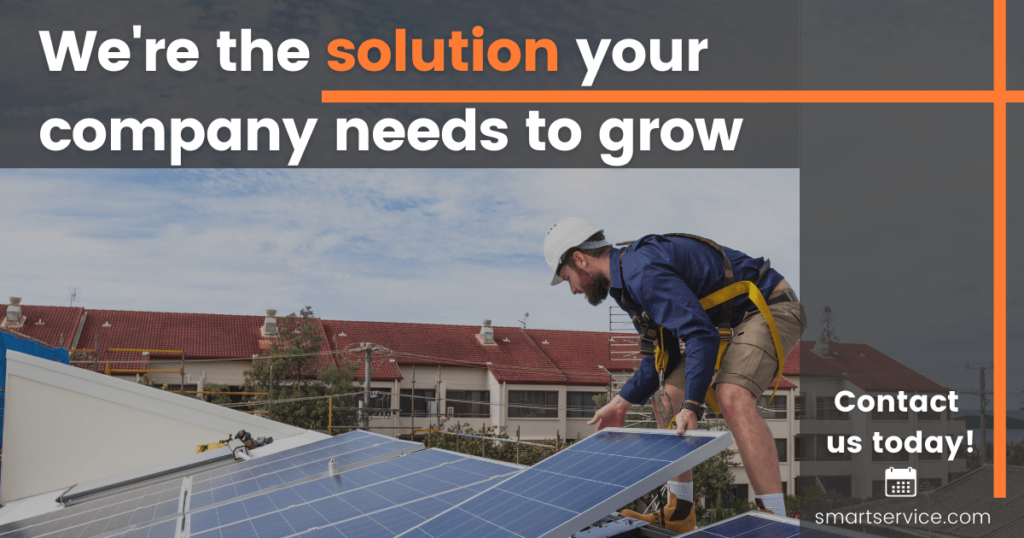
The Inflation Reduction Act is a groundbreaking federal law that was passed in 2022. The IRA has many benefits for homeowners, contractors, and small businesses. These benefits largely come in the form of tax credits and tax rebates. Many of these benefits have been extended through 2032.
Smart Service has the solutions you need to help you grow your contracting company or small business. Contact us today to inquire about a free demonstration!


